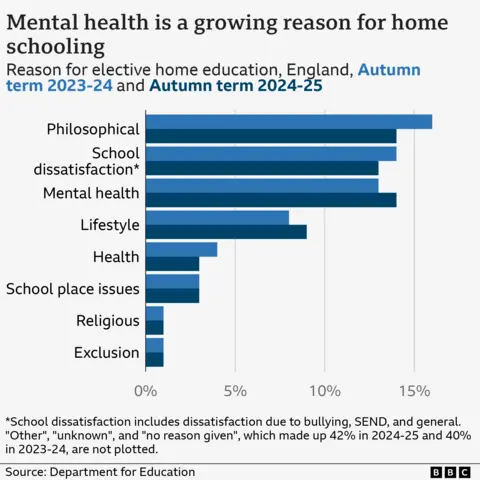Why is home education on the rise in the capital?
 Getty Images
Getty ImagesHome education is a "positive solution for those who struggle with school", says 12-year-old Addison, who started off in school but is now taught at home.
He is among the increasing number of young people who are home educated.
The number of children in the capital being educated at home has gone up from 9,540 in 2022-2023 to 11,780 in 2024-2025, Department for Education figures show.
Parents across England are choosing home education for reasons including lifestyle choices, religious or cultural beliefs, a rejection of an exam-based education or wanting to give their child more support with their educational needs or mental health, according to government data.
"I can't possibly think that home education is a problem," says Addison.
"There's many different reasons to home educate. It could be like you drop out of school because of bullying, or the school not working for you, or because you have special educational needs."

Home education is where you can teach your child at home, either full or part-time, which is also sometimes referred to as elective home education.
The biggest rise has been seen in Tower Hamlets, with a 63% increase from 240 to 390.
Bexley follows with a 58% rise, from 260 children to 410 and then Barking and Dagenham, from 350 to 550 - a 57% increase.
According to England-wide statistics, released at the end of last year, about 23% of parents or guardians say their reasons for home-educating are a result of lifestyle, philosophical or preferential choices or to move away from exam-based education.
Around 13% of families say it is because of school dissatisfaction, including a lack of support for special educational needs and disabilities and school bullying.
In addition, 14% say it is due to their child's mental health.
This is the first time the data has become mandatory, which the DfE said may account in part for the increase.
A DfE spokesperson said: "In the vast majority of cases, children can achieve and thrive best in schools; but we support parents' right to home educate when the education is suitable, and it is in the child's best interests.
"We want children to have the best life chances no matter the education setting."
For Ben, who has been home educated his whole school life, he says it gives him "the freedom to decide what I want to do".
"I basically do all of the school subjects but I like to do them in my own way," says the 13-year-old.
"In English, I'm now thinking about the texts I want to do for my GCSEs."

Under the Education Act, parents and guardians who are home educating can follow the national curriculum, but they do not have to.
They do have a responsibility to make sure the education they provide is appropriate for the child's age, their ability and any special education needs they may have.
There is currently no legal requirement for a parent to let the local authority know if they are educating at home.
However, the Children's Wellbeing and Schools Bill is currently going through parliament.
It has plans to include a Children Not in School register, so local authorities can identify all children not in school in their area and ensure that all children are receiving a suitable education.
Elements of the bill also include provision about the safeguarding and welfare of children, support for children in care or leaving care and regulation of independent educational institutions.
Ben says: "How do you distinguish between those who are vulnerable and those who are not?"
Addison adds: "I think they don't understand what it means to be home educated and until they understand what that means, the bill won't live up to its name and it won't help children's wellbeing."
A DfE spokesperson said: "High and rising standards are at the heart of this government's mission to break down opportunity and every child should have access to a high-quality education where they can achieve and thrive.
"So no child falls through the cracks, we have already confirmed plans to introduce statutory Children Not In School registers in our Children's Wellbeing Bill which will help ensure every child not in school is identified, and that those who are not safe or not in suitable education can be supported."
Beth Prescott, from the centre-right think tank, the Centre for Social Justice, says she thinks it is important the register is implemented in a way that "does not infringe upon their rights to home educate".
"It is for those children and those families for whom home education might not have been the first choice and we want to find those families and offer them support, should they want it," she says.
"For us, it is an extra safeguarding level for a very small minority of children where home is not a safe place, so we know where they are so we can help them if they need it."
The Children's Wellbeing and Schools Bill will be back in parliament on 20 May.
You can watch the latest edition of Politics London in full on BBC iPlayer
Listen to the best of BBC Radio London on Sounds and follow BBC London on Facebook, X and Instagram. Send your story ideas to [email protected]
